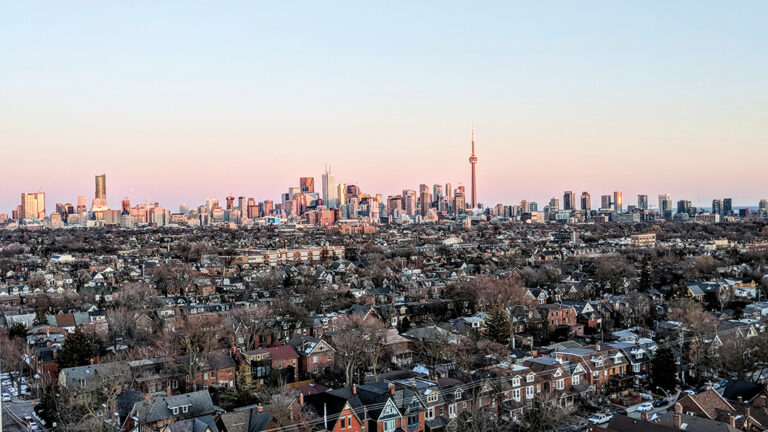The NPO Community Affordable Housing Solutions is an example of compound collaboration. It is the result of the efforts of a community group in Toronto that fought for affordable housing in the Bloor Dufferin area, efforts that resulted in an agreement between a real-estate developer, the city of Toronto and the community group. It is also the result of the synergy between Habitat for Humanity GTA, the St. Clare’s Multifaith Housing Society and the Co-operative Housing Federation of Canada to establish a land trust and to administer the funds raised by the agreement.
Established in 2020, NPO Community Affordable Housing Solutions is mandated to administer a $17-million land trust to develop affordable housing in the Greater Toronto Area. This funding is a result of an agreement initiated by the community group Build a Better Bloor Dufferin (BBBD) with a real-estate developer and the city of Toronto, a pact described as “historic” and “innovative”.
The history of CAHS is closely linked to the efforts of BBBD. This local group of volunteers wanted to ensure that a major new real-estate project in Toronto, in the central neighbourhood of Bloor Dufferin — a major magnet for gentrification — would not go ahead without the community having a say and receiving benefits.
“We’re a community group and we came together,” says Maggie Hutcheson, who represents BBBD. “We were concerned about the sale of a specific site. It was a big piece of public land owned by the Toronto District School Board. It was slated for redevelopment, and we really wanted to see significant community benefits on that land, because it had been public.”
One of the priorities that BBBD had for the site was the inclusion of affordable housing.
In the coming months, BBBD, the developer (Capital Developments and Metropia, who acquired the land) and the city negotiated for an agreement that would meet the needs of the various parties. Habitat for Humanity GTA was eventually called to assist in the discussions.
Two years later, in 2019, the negotiations resulted in a contribution of $17 million from the developer. Of that amount, $15 million is dedicated for the construction of affordable housing and $2 million is allocated to fund community space in the Bloor Dufferin sector.
But once the deal was done, a question remained,” says Melissa Estable, who sits on the CAHS board of directors. “Who [was] going to steward that money?”
“We’re not affordable-housing providers,” the BBBD’s Hutcheson notes. “We advocated for our neighbourhood, but we don’t have the infrastructure to deliver housing. We always wanted to see affordable housing on the site that would be operated and ideally owned by a non-profit.”
So CAHS —whose board includes people from Habitat for Humanity GTA, St. Clare’s Multifaith Housing Services, the Co-operative Housing Federation of Canada and a representative from BBBD — was created in May 2020 to administer the funds received for affordable housing.
“We knew we trusted that those organizations would really leverage that money,” says Hutcheson.
Since CAHS is still young, the Community Housing Transformation Centre provided a grant of $100,000 through its Sector Transformation Fund – Local Projects. This fund allowed the organization to establish itself and help it operate until it receives the funds from the developer, elaborates projects and can finance itself.
Affordability in perpetuity
Under the terms of the agreement, half of the projects would be developed outside of the Bloor Dufferin area. While BBBD admits it would have liked to have seen more money dedicated to housing on its own turf, “we care about affordable housing outside of our neighbourhood, too,” Hutcheson says.
To date, CAHS has two affordable-housing projects under development, including one in Scarborough. They were awarded through the city of Toronto’s Open Door Affordable Housing program. This program includes property-tax reductions and accelerated approval of selected projects.
The model developed by CAHS is based on land trusts, which were first established in the United States in the civil rights movement.
“A land trust buys land for the benefit of the people who live and work in the cities and neighbourhoods where they operate,” Estable said in an episode of the On the Way Home podcast. “It provides housing security to people at all income levels. It provides affordable housing forever.”
Since the CAHS brings together expertise in non-profit rental housing, housing co-ops and affordable properties, it is important for the organization to include these different types of affordable housing in its projects.
“Part of the purpose of the land trust was […] to provide the complete spectrum of community housing,” says Estable, who is not only involved in CAHS, but is also CHF Canada’s manager of co-op housing development. “We’re not saying affordable ownership is better than co-op or co-op is better than rental. It’s all needed at the end of the day.” Because someone who has purchased affordable property may, at another point in their life, need rental housing with support services, for example.
For Estable, the land-trust model is particularly exciting and has already been successful in the Vancouver area. “It’s a partnership approach. It’s about saying: ‘We’re stronger together.’ ”
Maggie Hutcheson says that BBBD has learned a lot from this whole process.
“It’s taught us that there’s a lot more negotiation to be done with developers and there’s such potential to truly build affordable housing and community space and have better community benefits out of these huge developments. I think it’s exciting to us that we did that.”
The picture for this article is by wyliepoon. It shows the Dufferin station of Toronto’s subway network, located in the Bloor Dufferin neighbourhood, and the public artwork Something Happens Here by Eduardo Aquino and Karen Shanski.



